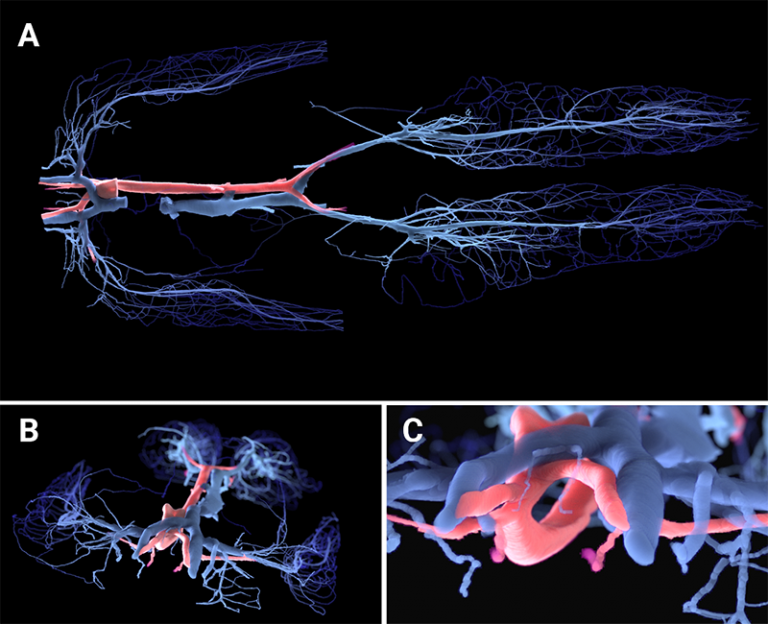UCL-led team wins time on world’s most powerful computer
3 January 2023
A UCL-led team of researchers is using the world’s first exascale computer to identify a shortlist of potential new drugs for diseases and to better understand how stroke affects the brain.

The supercomputer, Frontier, at the Oak Ridge Leadership Computing Facility in Tennessee, US, is the first in the world capable of an exaflop – a billion billion operations a second. A team led by Professor Peter Coveney (based in UCL Chemistry and the Advanced Research Computing Centre at UCL) is among research groups who have won access to the new computer, starting from the moment it entered production on 1 January.
The team will use Frontier for two projects. One aims to speed up drug discovery by using an artificial intelligence (AI) algorithm to screen millions of chemical compounds and identify the most promising drug candidates that can then be tested in a lab and potentially fast-tracked to a clinical trial.
In a second project, the supercomputer will be used to simulate blood flow in the brain in the seconds following a stroke. The team will build digital replicas of a part of the brain, the circle of Willis, using data from high-resolution imaging. They will simulate blood flow following different scenarios of blockages in the arteries, looking at how this changes pressure on artery walls, and inferring which areas of the brain are likely to be affected by the stroke most.
Professor Coveney said: “Frontier is a major step ahead of any other supercomputer in the world. It’s at the absolute peak of what is possible, opening up new areas of science that were previously inaccessible. By identifying a shortlist of potential drugs quickly, we hope to speed up the slow and expensive process of drug discovery, doing the early phase computationally rather than in a lab. This should enable companies to rapidly move on to compounds that are likely to be successful, improving a process that typically takes 10 years and costs billions – and often ends in failure.
“Understanding how strokes disrupt blood flow in the brain, meanwhile, should lead to a better prediction of an individual’s stroke risk. That is because the structure of each person’s vasculature can vary considerably, and so a stroke in the same location in an artery will have different consequences for different people. Some people will be at much higher risk from a stroke as a result.
“Understanding the likely effects of a stroke can also inform decision making around the best treatments.”
Professor Coveney’s team, which includes researchers from the universities of Oxford and Chicago, Rutgers University and the US’s Argonne National Laboratory, secured access to Frontier through an awards programme run by the U.S. Department of Energy’s Office of Science, called INCITE (Innovative and Novel Computational Impact on Theory and Experiment).

The INCITE programme is jointly managed by the Argonne Leadership Computing Facility (ALCF) and the Oak Ridge Leadership Computing Facility (OLCF).
Professor Gina Tourassi, director of the National Center for Computational Sciences, which houses the OLCF, said: “This is an exceptionally important year for us. Users now have access to a machine nearly ten times as powerful as our previous flagship system.”
Professor Michael E. Papka, director of ALCF, said: “These projects promise to represent the scientific community at its best. The breadth of scientific discipline and diversity of method this year’s allocations encompass — not to mention the dedicated researchers whose efforts will propel this work — demonstrate the power and potential of leadership computing systems to accelerate discovery as we transition into the exascale era, evolving data science, artificial intelligence, simulation, and their intersections to ever greater capability and impact.”
INCITE proposals are assessed by peer-review panels composed of international experts, with each panel representing a different scientific discipline. The proposals are also evaluated on a technical level by each computing facility for computational readiness and the scalability of the project’s code and its algorithms. The INCITE awards committee makes its final selections based on these recommendations.
Professor Coveney’s team were awarded 520,000 node hours on Frontier, which is 50 times faster than the most powerful computer in the UK, and 75,000 node hours on another supercomputer, Polaris.
Links
- Professor Peter Coveney’s research profile
- UCL Chemistry
- Advanced Research Computing Centre at UCL
- UCL Mathematical & Physical Sciences
- INCITE awards announcement
- Media coverage
Images
- Main image: A snapshot from a computer simulation shows how drugs act by blocking active sites in proteins. Credit for both images: Professor Peter Coveney
Media contact
Mark Greaves
E: m.greaves [at] ucl.ac.uk
 Close
Close

